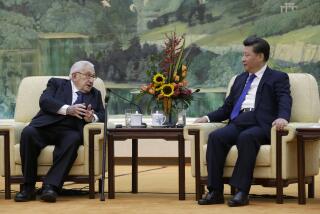Martin Indyk, former U.S. diplomat and author who devoted career to Middle East peace, dies at 73

- Share via
NORWICH, Conn. — Veteran diplomat Martin S. Indyk, an author and leader at prominent U.S. think tanks who devoted years to finding a path toward peace in the Middle East, died Thursday. He was 73.
His wife, Gahl Hodges Burt, confirmed in a phone call that he died from complications of esophageal cancer at the couple’s home in New Fairfield, Conn.
The Council on Foreign Relations, where Indyk had been a distinguished fellow in U.S. and Middle East diplomacy since 2018, called him a “rare, trusted voice within an otherwise polarized debate on U.S. policy toward the Middle East.”
A native of Australia, Indyk served as U.S. ambassador to Israel from 1995 to 1997 and from 2000 to 2001. He was special envoy for the Israeli-Palestinian negotiations during former President Obama’s administration, from 2013 to 2014.
Israel has assassinated two dozen Hezbollah commanders in Lebanon since last fall amid an intelligence war employing cellphones, drones and fake rocks.
When he resigned in 2014 to join the Brookings Institution think tank in Washington, it had symbolized the latest failed effort by the U.S. to forge an Israeli-Palestinian peace deal. He continued as Obama’s special advisor on Mideast peace issues.
“Ambassador Indyk has invested decades of his extraordinary career to the mission of helping Israelis and Palestinians achieve a lasting peace. It’s the cause of Martin’s career, and I’m grateful for the wisdom and insight he’s brought to our collective efforts,” then-Secretary of State John F. Kerry said at the time, in a statement.
In a May 22 social media post on X, amid the continuing Israel-Hamas war in Gaza, Indyk urged Israelis to “wake up,” warning them their government “is leading you into greater isolation and ruin” after a proposed peace deal was rejected. Indyk also called out Israeli Prime Minister Benjamin Netanyahu in June on X, accusing him of playing “the martyr in a crisis he manufactured,” after Netanyahu accused the U.S. of withholding weapons that Israel needed.
“Israel is at war on four fronts: with Hamas in Gaza; with Houthis in Yemen; with Hezbollah in Lebanon; and with Iran overseeing the operations,” Indyk wrote on June 19. “What does Netanyahu do? Attack the United States based on a lie that he made up! The Speaker and Leader should withdraw his invitation to address Congress until he recants and apologizes.”
Israel’s attack in Yemen — after Houthi rebels hit Tel Aviv — gives militant group the legitimacy it craved, experts say, as fears of regional war rise.
Indyk also served as special assistant to former President Clinton and senior director for Near East and South Asian affairs at the National Security Council from 1993 to 1995. He served as assistant secretary of state for Near Eastern affairs in the U.S. Department of State from 1997 to 2000.
Besides serving at Brookings and the Council on Foreign Relations, Indyk worked at the Center for Middle East Policy and was the founding executive director of the Washington Institute for Near East Policy. Indyk’s successor at the Washington Institute called him “a true American success story.”
Israel under fire for ‘GPS spoofing’ affecting airplane navigation systems in Lebanon, Syria, Jordan, Egypt, Turkey and Cyprus.
“A native of Australia, he came to Washington to have an impact on the making of American Middle East Policy and that he surely did — as pioneering scholar, insightful analyst and remarkably effective policy entrepreneur,” Robert Satloff said. “He was a visionary who not only founded an organization based on the idea that wise public policy is rooted in sound research, he embodied it.”
Indyk wrote or co-wrote multiple books, including “Innocent Abroad: An Intimate Account of American Peace Diplomacy in the Middle East” and “Master of the Game: Henry Kissinger and the Art of Middle East Diplomacy,” which was published in 2021.
Haigh writes for the Associated Press.
More to Read
Sign up for Essential California
The most important California stories and recommendations in your inbox every morning.
You may occasionally receive promotional content from the Los Angeles Times.













